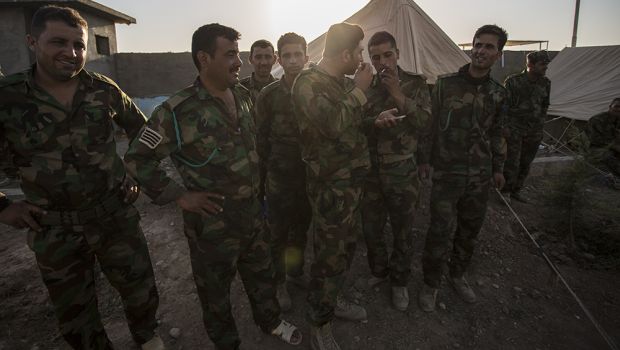
Kurdish Peshmerga soldiers near the town of Jaloula preparing for deployment in the battle against the militant Islamic State of Iraq and Syria in mid-June 2014. (Asharq Al-Awsat/Hannah Lucinda Smith)
Jaloula, Asharq Al-Awsat—Intelligence and security officials in Iraq’s Kurdish region say they warned Baghdad and Western intelligence agencies six months ago about an impending attack by the Islamic State of Iraq and Syria (ISIS).
Rooz Bahjay, a senior security official in the Kurdistan Regional Government (KRG), told Asharq Al-Awsat that they had passed on information about key figures within the terrorist movement, shared the locations of ISIS training camps within Iraqi territory, and warned that the group was taking large vehicle convoys back and forth across the border between Syria and Iraq, but that no action was taken.
“It all fell on deaf ears,” said Bahjay. “The West failed to act, and now it’s failing to react. The longer they wait, the more people are going to be killed.”
Following the failure of the Iraqi army in Mosul last week, the Peshmerga—the Kurdish armed forces—have taken control of all the Kurdish areas in the country, including the disputed city of Kirkuk. While most towns in the region now appear to be secure and calm, there are ongoing clashes between the Peshmerga and ISIS on the edges of the Kurdish-controlled area. Commanders say they need outside support if they are to continue their push back against the feared and increasingly powerful terrorist group.
“We can’t keep this up forever,” said Bahjay. “We need military aid, financial support, weapons and ammunition. If none exists, at least give us some air coverage. We know the locations of these fighters, we know where their headquarters are, where they keep their bombs and their missiles.”
In Jaloula, a town on the edge of the Kurdish region that is home to a mixed population of Kurds and Sunni Arabs and is just 80 miles (128 kilometers) from Baghdad, the Peshmerga have been battling for three days to hold off an ISIS assault, despite earlier assurances from ISIS commanders that they were not seeking to advance into Kurdish territory.
“On Tuesday morning we got reports that a large group of ISIS fighters had moved into an area between Sadiyah and Jaloula, which turned out to be true,” said Polat Talabany, the head of the Peshmerga’s elite Counterterrorism Unit. “They called some of our commanders and told us we could advance into the area without a fight, but to give them a couple of hours to clear out of the area. We held off for two hours, but that allowed them to strengthen up their lines and dig in before attacking us.”
Talabany told Asharq Al-Awsat that ISIS is also drawing support from the local Arab Sunni population around Jaloula. The leader of the local Kilawi tribe, Sheikh Faisal, is one of the powerful local figures supporting the ISIS advance.
“Some of the local population will welcome us as we go past, and then pick up their AKs and shoot at us from behind,” said Talabany. “It wasn’t a shock but it’s still quite surprising that they would do that with their wife and children next to them.”
The depth of the local Sunni Arab support for the ISIS campaign has been a hotly discussed issue since the fall of Mosul last Tuesday. Iraqi Prime Minister Nuri Al-Maliki has been accused of alienating much of his Sunni population by favoring Iraq’s Shi’ites in his policies, excluding former Ba’ath party members from state employment and failing to build an inclusive, multi-ethnic state.
“There were indications of what was going to happen with [the protests in] Ramadi and Fallujah,” said Bahjay. “You can’t clap with one hand. This is both an ISIS attack and a Ba’athist coup.”
The Mosul takeover has provided ISIS and its allies with access to around 1.5 billion dollars in cash and a huge arsenal of advanced weaponry that was gifted to the Iraqi army by the United States following the fall of Saddam Hussein in 2003. The terrorist group is now using those very weapons to attack Iraqi forces and the Peshmerga.
“On Tuesday we captured a few weapons that only the special units in Baghdad have,” said Talabany. “We were getting attacked with Humvees while we were in pick-ups. They have enough ammunition and weapons to fight for a very long time, and at the moment they know they have no threat of airstrikes, so they’re moving around freely.”
Many of ISIS’s troops are experienced fighters who have gained extensive knowledge of urban warfare and counter-surveillance during their campaign in the Syrian city of Aleppo.
Peshmerga commanders told Asharq Al-Awsat that they had watched ISIS fighters empty full magazines of bullets into the faces of their dead comrades to prevent them from being identified. The group also makes sophisticated use of social media to conduct its terror campaign, posting grisly videos of executions and violent punishments online.
“On the first day we were scared because we saw the videos on YouTube,” said Daban, one of the Peshmerga who has been battling on the Jaloula front line. “But when we fight them we see they are not very brave.”
“It’s the snipers that are causing us the biggest problems,” said Sohan, a 23-year-old Peshmerga who is also fighting on the front line near Jaloula. “We don’t know where they are.”

